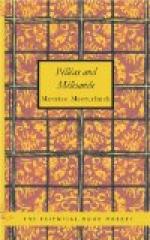MELISANDE.
Where wouldst thou?
PELLEAS.
In the park; near “Blind Man’s Spring.”—Wilt thou?—Wilt thou come?
MELISANDE.
Yes.
PELLEAS.
It will be the last night;—I am going to
travel, as my father said.
Thou wilt not see me more....
MELISANDE.
Do not say that, Pelleas.... I shall see thee always; I shall look upon thee always....
PELLEAS.
Thou wilt look in vain.... I shall be so far away thou couldst no longer see me.... I shall try to go very far away.... I am full of joy, and you would say I had all the weight of heaven and earth on my body to-day....
MELISANDE.
What has happened, Pelleas?—I no longer understand what you say....
PELLEAS.
Go, go; let us separate. I hear some one speaking behind that door.... It is the strangers who came to the castle this morning.... They are going out.... Let us go; it is the strangers.... [Exeunt severally.
SCENE II.—An apartment in the castle. ARKEL and MELISANDE discovered.
ARKEL.
Now that Pelleas’s father is saved, and sickness, the old handmaid of Death, has left the castle, a little joy and a little sunlight will at last come into the house again.... It was time!—For, since thy coming, we have only lived here whispering about a closed room.... And truly I have pitied thee, Melisande.... Thou camest here all joyous, like a child seeking a gala-day, and at the moment thou enteredst in the vestibule I saw thy face change, and probably thy soul, as the face changes in spite of us when we enter at noon into a grotto too gloomy and too cold.... And since,—since, on account of all that, I have often no longer understood thee.... I observed thee, thou went there, listless perhaps, but with the strange, astray look of one awaiting ever a great trouble, in the sunlight, in a beautiful garden.... I cannot explain.... But I was sad to see thee so; for thou art too young and too beautiful to live already day and night under the breath of death.... But now all that will change. At my age,—and there perhaps is the surest fruit of my life,—at my age I have gained I know not what faith in the fidelity of events, and I have always seen that every young and beautiful being creates about itself young, beautiful, and happy events.... And it is thou who wilt now open the door for the new era I have glimpses of.... Come here; why dost thou stay there without answering and without lifting thine eyes?—I have kissed thee but once only hitherto,—the day of thy coming; and yet old men need sometimes to touch with their lips a woman’s forehead or a child’s cheek, to believe still in the freshness of life and avert awhile the menaces.... Art thou afraid of my old lips? How I have pitied thee these months!...




